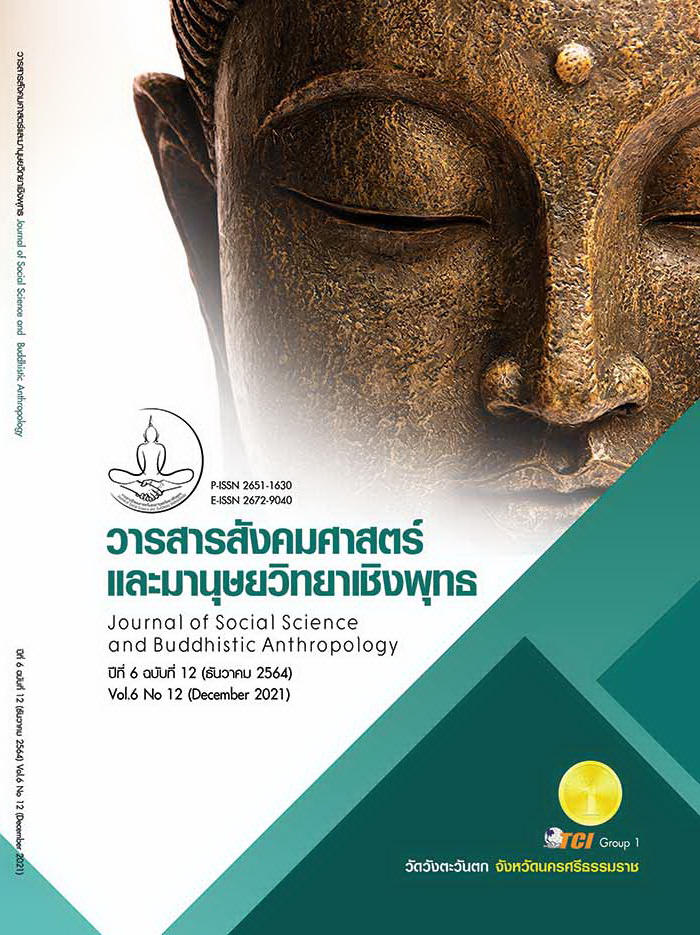THE TERMS THAT MEAN "PEOPLE" IN THE CAMBODIAN CONSTITUTION
Keywords:
Cambodia, People, Cambodian Constitution, The terms in Cambodian ConstitutionAbstract
The objectives of this research article were to 1) know the words which mean people in Cambodian constitutions 2) realize the difference in meaning of words which mean people in Cambodian constitutions. This study is documentary research. All vocabularies and which mean people the contexts in all 6 Cambodian constitutions have been collected and the frequency of words used in Cambodian constitutions has also been counted. The study showed that 1) There are 5 words mentioning the people which are 1.1) ពលរដ្ឋ (citizen) 1.2) ប្រជាជន (people) 1.3) ប្រជាពលរដ្ឋ (population) 1.4) ប្រជារាស្ត្រ (populace) 1.5) ខេមរជន (Khmer nationality) appeared respectfully in all 6 constitutions. 2) These 5 words have been used differently in context as followed: 2.1) ពលរដ្ឋ was used in the context of people’s rights, liberties and duties as stated in constitutions and also associated with driving force process for national development. 2.2) ប្រជាជន referred to general people who are living in Cambodia. It mostly was used in plural form referred to many people and different from word ពលរដ្ឋ because it was not focused on rights, liberties and duties. 2.3) ប្រជាពលរដ្ឋ referred to both people and population together and was used in the context that means people in the whole country and context of people who were born and living in Cambodia and people’s rights, liberties and duties as stated in constitutions. 2.4) ប្រជារាស្ត្រ was mainly used in the context that related to the King and this word was originated and used in monarchy political system. This showed that there are social classes division in Cambodian society. 2.5) ខេមរជន was used referring to Khmer people in specific context.
References
เกา มุยทอง และเม็ย วิจิตร. (2549). รัฐธรรมนูญกัมพูชา. พนมเปญ: บรรณาคารอังกอร์.
จินดา ดวงจินดา. (2521). รัฐธรรมนูญกัมพูชาประชาธิปไตยและบทวิเคราะห์. กรุงเทพมหานคร: แสงรุ้งการพิมพ์.
ธานินทร์ กรัยวิเชียร และอภิชน จันทรเสน. (2547). คำแนะนำนักศึกษากฎหมาย (พิมพ์ครั้งที่ 4). กรุงเทพมหานคร: มหาวิทยาลัยธรรมศาสตร์.
ประภัสสร ภัทรนาวิก. (2549). ภาษาในรัฐธรรมนูญแห่งราชอาณาจักรไทย พุทธศักราช 2550: การศึกษาเปรียบ เทียบกับรัฐธรรมนูญแห่งราชอาณาจักรไทยในอดีต. ใน ดุษฎีนิพนธ์อักษรศาสตรดุษฎีบัณฑิต สาขาวิชาภาษาไทย. จุฬาลงกรณ์มหาวิทยาลัย.
ปิยบุตร แสงกนกกุล. (2558). กฎหมายรัฐธรรมนูญและสถาบันการเมืองกัมพูชา: จากความขัดแย้งทางการเมืองสู่การสถาปนานิติรัฐประชาธิปไตย. ใน รายงานการวิจัย. มหาวิทยาลัยธรรมศาสตร์.
. (2559). รัฐธรรมนูญ ประวัติศาสตร์ ข้อความคิด อำนาจสถาปนา และการเปลี่ยนผ่าน. นนทบุรี: ฟ้าเดียวกัน.
สมชาย ปรีชาศิลปกุล. (2555). การศึกษารัฐธรรมนูญไทย 4 แนวทาง. วารสารนิติสังคมศาสตร์, 5(2), 29-43.
สำนักเลขาธิการที่ปรึกษาธรรมนูญ. (2554). รัฐธรรมนูญทั้งหลายของกัมพูชา. กรุงพนมเปญ: สำนักเลขาธิการที่ปรึกษาธรรมนูญ.
อุป เสา สงหา. (2555). ประชาราษฎร์เขมรกับการเมือง. เรียกใช้เมื่อ 1 กุมภาพันธ์ 2564 จาก https://data.over-blog-kiwi.com
เอียว เกิส. (2538). ภาษาเขมร การทดลองพิจารณาโดยหาเหตุผล. กรุงพนมเปญ: พุทธศาสนบัณฑิต.
Jennar, R. M. (1995). The Cambodian Constitutions, 1953 - 1993. White Lotus: Bangkok.
Menzel, J. (2016). Cambodia from civil war to a Constitution to constitutionalism. In Hor P. et al. (ed.)Cambodian Constitutional Laws. Phnom Penh: Konrad - Adenauer - Stiftung.
Yan, V. (2016). The Historical Development of Cambodia’s Constitutions. in In Hor P. et al. (ed.)Cambodian Constitutional Laws. Phnom Penh: Konrad - Adenauer - Stiftung.
Downloads
Published
How to Cite
Issue
Section
License
Copyright (c) 2021 Journal of Social Science and Buddhistic Anthropology

This work is licensed under a Creative Commons Attribution-NonCommercial-NoDerivatives 4.0 International License.









